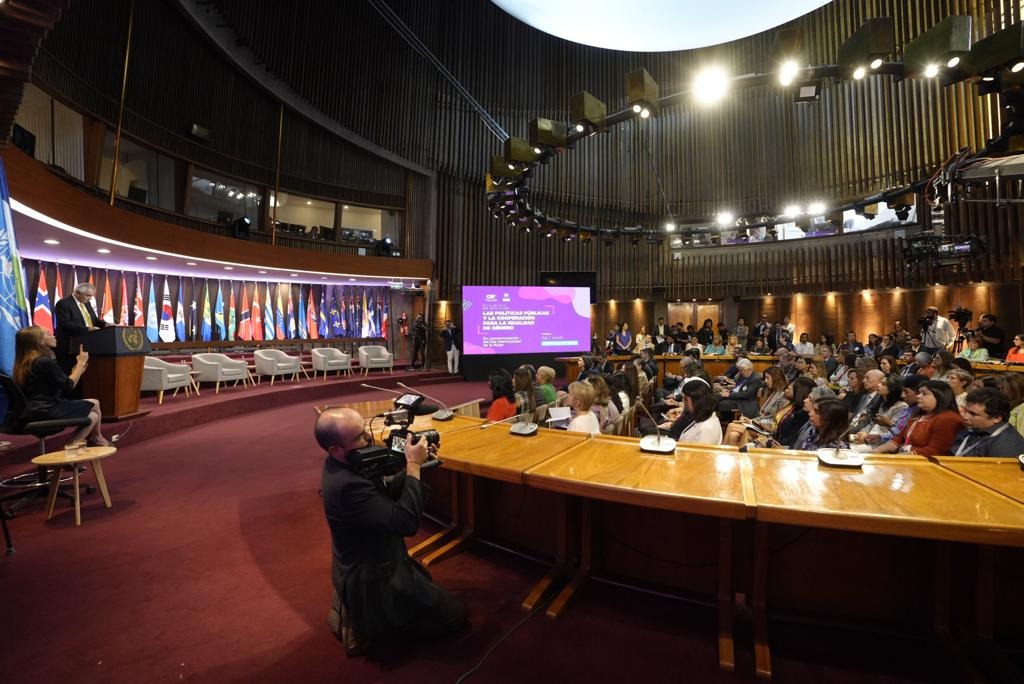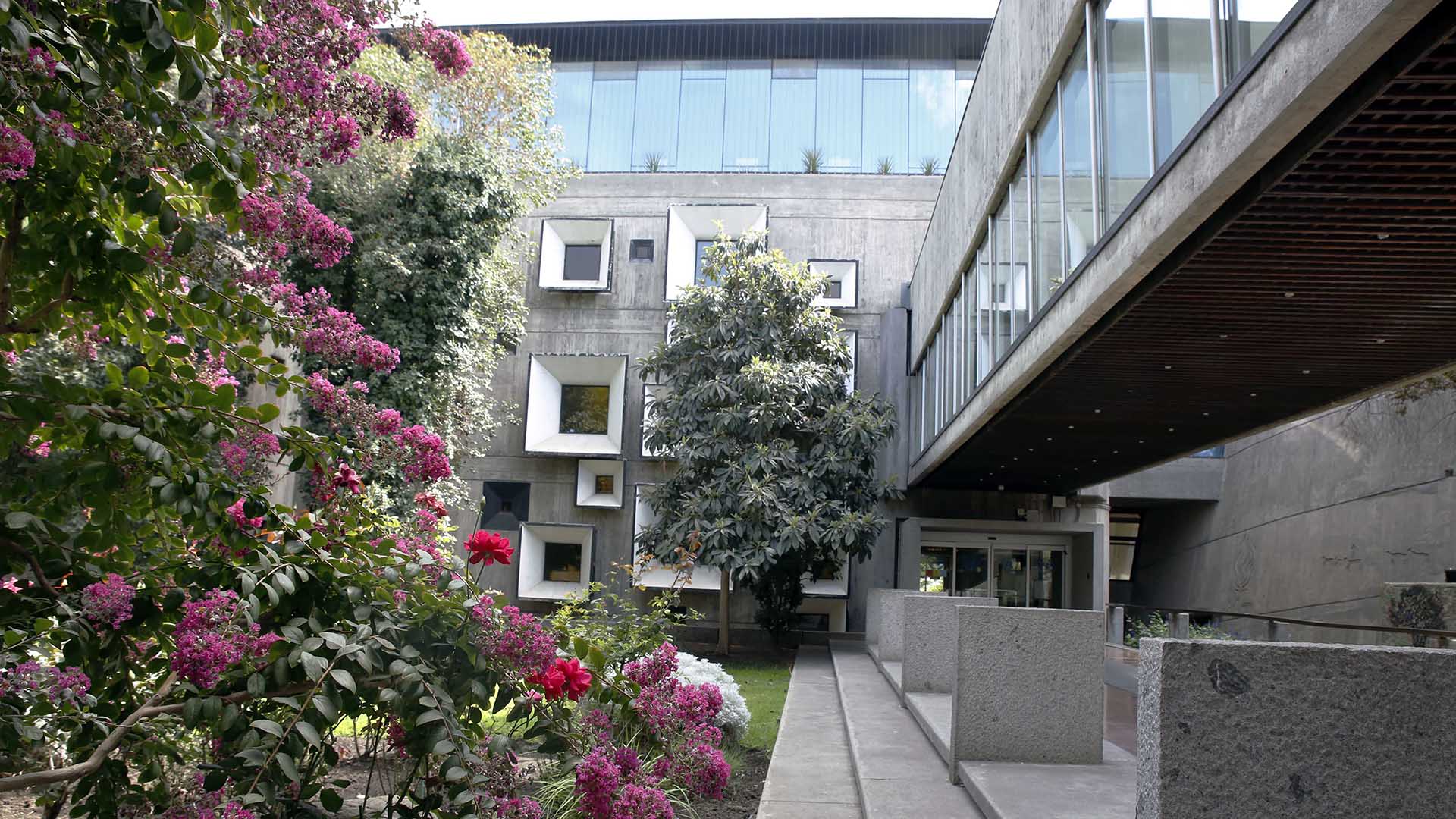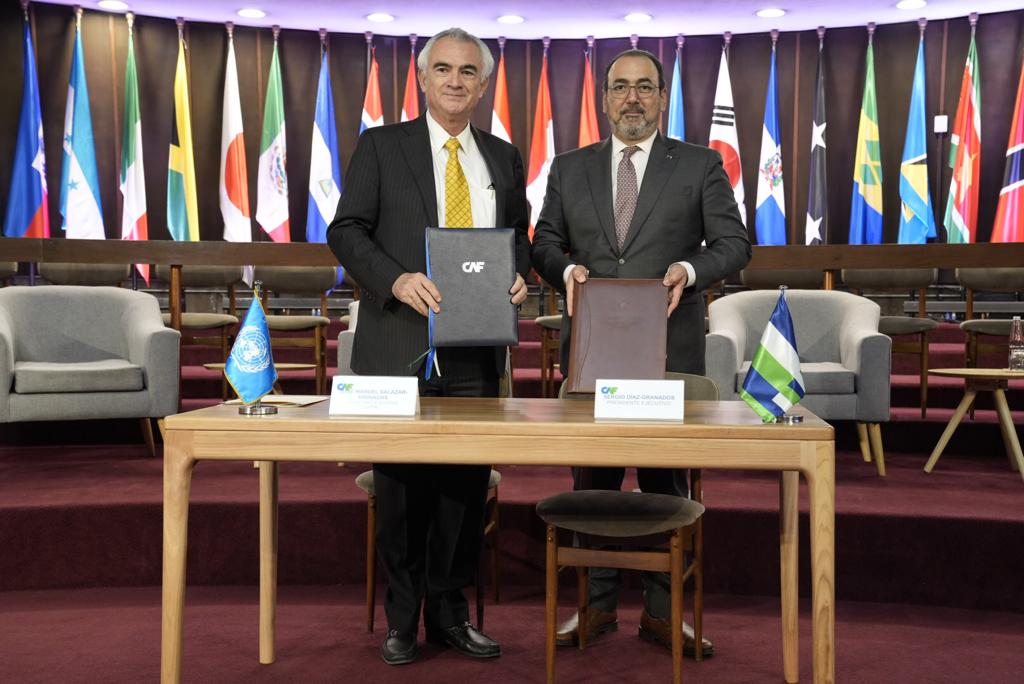Latin America and the Caribbean is Very Far from Achieving Parity Democracy, Authorities and Experts Warned at a CAF-ECLAC Event
Work area(s)
Women’s participation in public decision-making processes stands at around 30% on average across the region.

Parity democracy, based on gender equality, is very far from being achieved in Latin America and the Caribbean, authorities and experts sustained at the High-level Meeting: Public Policies and Cooperation for Gender Equality, organized by the CAF Development Bank of Latin America and the Economic Commission for Latin America and the Caribbean (ECLAC) in Chile on Monday, March 6.
The meeting was connected to the observance of International Women's Day and coincided with the meeting of the CAF board of directors at ECLAC’s headquarters, with Chile hosting the event.
During the event, CAF and ECLAC fostered a high-level dialogue where experiences, ideas and proposals were shared on the pressing challenges of gender mainstreaming in public policy design and implementation and regional cooperation.
The opening remarks were offered by ECLAC’s Executive Secretary, José Manuel Salazar-Xirinachs, CAF Executive President Sergio Díaz-Granados, and the Chilean Undersecretary of Women and Gender Equity, Luz Vidal Huiriqueo.
Successive shocks in Latin America and the Caribbean threaten to halt or even reverse the progress achieved in gender equality and the rights of women and girls in all their diversity. This jeopardizes not only women's autonomy but also the sustainable development of the region, warned José Manuel Salazar-Xirinachs.
ECLAC’s highest authority noted that while women’s participation in public decision-making processes stands at around 30% in the region, only 15% of mayors in Latin America and the Caribbean are women.
“This means the parity democracy that the region seeks is very far from being achieved,” José Manuel Salazar-Xirinachs stated, calling for “more cooperation, more integration, more funding and more women and men committed to gender equality in decision-making.”
The Buenos Aires Commitment, approved at the recent XV Regional Conference on Women in Latin America and the Caribbean and part of the Regional Gender Agenda, is a key instrument that provides guidelines for implementing a new kind of development pattern based on equality and the sustainability of life, affirmed the commission’s secretary. In this regard, Salazar-Xirinachs also emphasized that ECLAC is advocating for a care society based on equality as a bold response to the development crisis.
For his part, CAF Executive President Sergio Díaz-Granados pointed out “that gender equality continues to be one of the greatest challenges facing Latin America. Without effective, decisive funding actions and efforts to overcome current inequalities, we will not develop to our fullest potential.”
In this regard, Díaz-Granados explained, “one year ago, we launched our strategy for gender equality and appointed a manager of Gender, Diversity and Inclusion to ensure equality across CAF's operations.”
Celebrating Chile's reincorporation as a full member of CAF, the Chilean Undersecretary of Women and Gender Equity, Luz Vidal Huiriqueo, assured that “every opportunity for economic development for women is an opportunity for autonomy and decision.” “We cannot simply continue to bemoan poverty, bemoan inequality, bemoan the loss of lives of women and girls. We must work together as States” to eradicate economic, political and physical violence against women, she added.
Later, former Chilean President Michelle Bachelet, who served as the first Executive Director of UN Women and as former United Nations High Commissioner for Human Rights, offered a keynote speech. In Bachelet's words, “gender equality goes beyond any one public policy: it is an urgent matter that merits constant attention by countries because of its concrete, grave effects on millions of lives.”
“I am pleased that gender equality is at the center of questions surrounding development. We see how social movements and women leaders, officials, entrepreneurs, scholars and activists have continuously persevered to show that women’s participation on equal footing and without exclusion is the only way to aspire to development,” said Bachelet.
“We have to jointly renew our potential for fair, humane, sustainable development and take the one path that enables freedom and legitimate decisions: full democracy. More than ever, we must renew our hope and our possibilities. More than ever, we must emphasize that better development is in our hands, along with a better present and future for one and all,” she concluded.
Later, a panel was held on equality policies and equality in politics. Speakers included Renata Vargas Amaral, Secretary of International Affairs and Development at the Ministry of Budget and Planning of Brazil; Claudia Sanhueza Riveros, Undersecretary of Finance of Chile; Chilean Undersecretary Luz Vidal Huiriqueo; Michelle Muschett, Assistant Administrator and Director of the Regional Bureau for Latin America and the Caribbean of the United Nations Development Programme (UNDP); and Carolina Leitao, President of the Association of Municipalities and Mayor of Peñalolén (Chile). Ana María Baiardi, the CAF Gender, Diversity and Inclusion Manager, gave the opening speech and Ana Güezmes, Director of ECLAC’s Division for Gender Affairs, served as moderator.
María José Torres, UN Resident Coordinator in Chile, and CAF Secretary-General Alejandra Claros also spoke.
According to a document prepared by ECLAC’s Gender Equality Observatory
for Latin America and the Caribbean for International Women's Day 2023, “In the past 45 years, at the Regional Conferences on Women in Latin America and the Caribbean, States have made progress on a profound, progressive, comprehensive Regional Gender Agenda. This agenda guides national public policies to achieve gender equality, in regulatory and substantive terms, guaranteeing women’s rights and autonomy. Ensuring women's political representation and full participation in public posts, and achieving parity democracy, is one of the region's goals.”
Since the approval of the world’s first gender quota laws in Argentina in 1991, several countries in the region have enacted or expanded on similar legislation. By 2022, nine countries had quota laws in place for elected positions while nine had made constitutional reforms or passed other laws aimed at promoting gender parity.
However, according to ECLAC, structural constraints of patriarchy persist in the political systems of the region’s countries, hindering progress towards parity democracy.
During the last presidential administrations across Latin America and the Caribbean, 28.7% of the ministers were women. As of August 2022, 36 countries and territories in the region had 25% or more of their cabinet posts held by women. Only Costa Rica (50%) and Chile (58%) have achieved gender parity in their governments. In the Caribbean, all countries except Anguilla, Barbados, Guyana and Trinidad and Tobago had at least one woman minister.
In terms of parliamentary representation, women held on average 34.9% of national legislative posts in 2022. According to estimates, it will take another 40 years to achieve gender parity in parliaments.
Meanwhile, women have achieved important gains at the municipal leadership level: on average, women held 32.7% of elected city council posts as of December 2021.
According to ECLAC, there are myriad institutional, social and cultural structures that continue to restrict women’s access to public posts. These include the sexual division of labor and the social organization of care, gender-based violence against women in public and political life, and the political culture and strategies of political parties that have yet to fully embrace gender parity as a guiding principle. Another issue is the limited information available on the diversity of individuals elected or appointed to decision-making posts, preventing an intersectional analysis that could highlight the additional barriers certain women face, especially those with fewer resources, networks and time.
Related content

CAF and ECLAC Extend an Invitation to Discuss Fiscal Decentralisation and Cooperation for Gender Equality in Latin America
On Monday, March 6, two high-level events will be held in person at ECLAC's regional headquarters in Santiago, Chile.

CAF y la CEPAL fortalecen la cooperación por el desarrollo en América Latina y el Caribe
El banco de desarrollo de América Latina y la Comisión Económica para América Latina y el Caribe de las Naciones Unidas (CEPAL), firmaron un Memorándum de Entendimiento para articular acciones en…
Type
Country(ies)
- Latin America and the Caribbean
Contact
Public Information Unit
- prensa@cepal.org
- (56 2) 2210 2040
